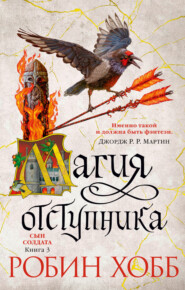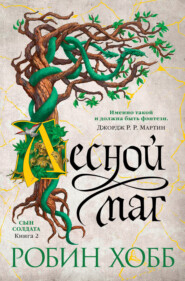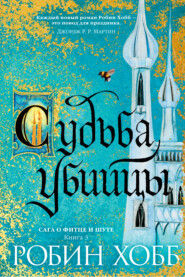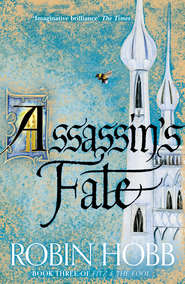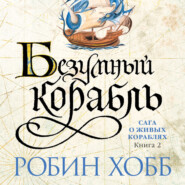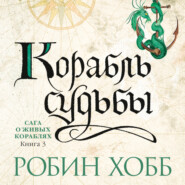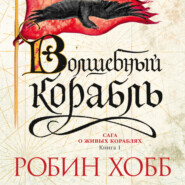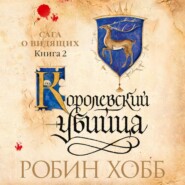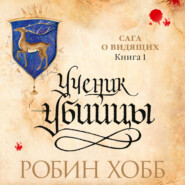По всем вопросам обращайтесь на: info@litportal.ru
(©) 2003-2024.
✖
Ship of Destiny
Автор
Год написания книги
2019
Настройки чтения
Размер шрифта
Высота строк
Поля
‘Traitor!’ Cosgo lifted a trembling finger and pointed at her. ‘Only a traitor could speak so to me! I am the Satrap of all Jamaillia. I condemn you to live-flaying and to be burnt afterwards. I swear that if we live, I will watch my sentence carried out on you.’ He looked past her at Kekki. ‘Companion. Witness my words. If I die and you survive, it is your duty to make my will known to others. See that bitch punished!’
Malta glared at him but said nothing. She tried to work moisture into her throat but found none. It galled her to let his words stand, but she had no choice. She turned her back on him.
Tintaglia sated her hunger with a foolish young boar. She had spotted him rooting at the edge of an oak grove. At the sight and scent of him, hunger had roared in her. The foolish pig had stood, staring at her curiously as she stooped down to him. At the last moment, he had brandished his tusks at her as if that would scare her off. She had devoured him in a matter of bites, leaving little more than blood-smeared leaves and detritus to show he had ever existed. Then she had taken off again.
Her voracity almost frightened her. For the rest of the afternoon, she flew low, hunting as she travelled, and killed twice more, a deer and another boar. They were sufficient to her hunger, but no more than that. The grumbling of her belly kept distracting her from her avowed intention. At one point, she lifted her eyes to scan the general lie of the land and was suddenly aware she had been paying no attention to where she was flying. She could no longer see the river.
She forced herself to stop thinking of her belly. Swiftly she soared across the wide swampy valley until she returned to the choked thread of the river. Here the trees encroached on the flow of water, and the swampy banks of the river spread wide beneath the forest canopy. Nothing promising here. Once more, she flew upstream, but this time she drove herself, flying as swiftly as ever she had, looking, always looking for a familiar landmark or a sign of Elderling occupation. Slowly the river widened again, the forest retreating. Soon it regained grassy banks as she followed its flow into foothills. The land around it was firmer here, more true forest than swamp. Then, with heart-stopping suddenness, she recognized where she was. On the horizon, in a bend of the river, she glimpsed the map-tower of Kelsingra. It glinted in the westering sun, and her heart lifted. It still stood, and her eyes picked out the detail of other familiar buildings around it. In the next instant, her heart sank. Her nose brought her no odours of chimney smoke or foundry and forge at work.
She flew toward the city. The closer she came, the more obvious became its death. The road was not only completely devoid of the lively traffic it had once sustained; at one point, a landslide had sheared the road away entirely. The memory stone still recalled blackly that it had been told to be a road. She could sense the trapped memories of the merchants and soldiers and nomadic traders who had once traversed it still humming in the stone. Grass and moss had not overcome it. The road still shone, black, straight and level as it made its businesslike way to the city. The road still recalled itself as a highway, but no one else in the world did.
She circled above the deserted city and looked down on its ancient destruction. The Elderlings had built the city for the ages, built it blithely assuming that they would always stroll its streets and inhabit its gracious homes. Now its emptiness mocked all such mortal illusions. Sometime in the past, a cataclysmic settling of the earth had riven the city in two. A huge cleft divided it, and the river had claimed that sunken piece for itself. She could glimpse the rubble of sunken buildings in the depths. Tintaglia blinked her eyes, forcing herself to see the city as it was rather than how the memory stone recalled itself. Thus had the Elderlings built, cutting the memory stone and bringing it here to build their fair city on the plains by the river. They had bound the stone, forcing into it their concept of what it was to be. Faithful and silent, the city stood.
Tintaglia came to the city as the dragons always had, and nearly killed herself in the process. Always, her ancestral memories told her, the dragons had arrived by landing in the river itself. It made a spectacularly showy arrival. The sliding plunge from the blue sky into the cool water always sent up a great feathery splash. The alighting of a dragon always set all the docked ships to rocking in their berths. The water cushioned the landing, and then the dragon would wade out of the cool depths onto the pebbled shore to the cheers and greetings of the gathered folk.
The river was far shallower than her ancient memories told her it would be. Instead of plunging completely beneath it and letting the water catch her, Tintaglia crashed into it. It was scarcely shoulder-deep on her, and she was fortunate not to break her legs. Only the cushioning of her powerful muscles kept her from harm. She cracked two claws on her left foreleg, and bruised her outstretched wings painfully as she caught herself and waded out of the river not to cheers and songs of welcome but to the whispering of the wind among the deserted buildings.
She felt as if she wandered through a dream. The memory stone was near impervious to the encroaching of organic life. As long as it recalled what it was supposed to be, it rejected the tendrilling roots of plants. Animals who might have claimed the city as a place to nest and den were turned aside by the stone’s memories of men and women dwelling there. Even after all these years, she saw only tentative signs that the natural world would eventually reclaim this place. Moss had begun to find its first footholds in the fine cracks between the paving stones and in the angles of the steps. Crows and ravens, ever scornful of humanity’s claims of mastery, had a few messy nests jutting out from window ledges or wedged into belfries. Algae stained the edges of the fountains that still held rainwater trapped in their ornate basins. Domes had caved in on themselves. The outer walls of some buildings had collapsed in some long-ago quake, leaving the interior chambers open to the autumn day and scattering rubble across the street below it. Eventually, nature always triumphed. The Elderlings’ city would ultimately be swallowed by the wild world, and then no one would remember a time when man and dragon had dwelt together.
It surprised Tintaglia that such a thought could cut her heart. Humanity as it now existed little appealed to her. There had been a time, her ancestors whispered in the back of her brain, when dragon essence mingled with the nature of men, and Elderlings emerged from that accidental blending. Tall and slender, dragon-eyed and golden-skinned, that ancient race had lived alongside dragons and gloried in the symbiosis. Tintaglia walked slowly down streets made generously wide enough to allow a dragon to pass in ease. She came to their halls of government, and ascended the wide, shallow steps that had been engineered to allow her kind gracious access to the gathering halls of the Elderlings. The exterior walls of this building still gleamed blackly, while figures of gleaming white decorated the exterior in bas-relief. Cariandra the Fecund still endlessly ploughed her fields behind her team of massive oxen, while on the adjacent wall Sessicaria spread wide his wings and trumpeted silently.
Tintaglia passed between the impassive stone lions that guarded the entrance. One wide door had already collapsed. As she brushed past the other immense wooden door, a chance graze of her tail brought it slumping down into a heap of splinters and fragments. Wood had not the memory of stone.
Within, polished oak tables had given way to become heaps of wood dust trapped under the stone tabletops they had once supported. Dust had coated thick the windows; sunlight hardly penetrated the room. Threadbare reminders of rich tapestries were shredded cobwebs on the walls. Memories clustered thickly here and clamoured at her, but she resolutely kept her mind to this day and this time. Silence and dust and the wind whispering dismally through a broken window. Perhaps somewhere in the building written records had survived. But fading words on crumbling parchment would be no solace to her. There was nothing here for her.
For a moment longer, she stood, looking about, then she flung herself back on her hind legs and stretched out her neck to roar her anger and disappointment, trumpeting out her betrayal to the infuriating ghosts of the place. The blast of her voice shook the stagnant air of the room. Her lashing tail scattered the fragments of desks and benches and flung a marble table-top crashing into a corner. Across the hall, a tapestry gave up its last futile grip and cascaded to the floor in threads. Dust motes whirled alarmingly in the air. She whipped her head back and forth on the end of her serpentine neck, trumpeting out blast after blast of fury.
Then, as suddenly as the fit had seized her, it passed. She let her front legs drop back to the cool black floor. She fell silent and listened to the last echoes of her own voice fade and die. Fade and die, she thought. They all have done so, and I am the last foolish echo, still bouncing off these stones with no ears to hear me.
She left the hall and prowled the deserted streets of the dead city. Light was fading from the day. She had flown swift and hard to come to this place, only to discover death here. The stalwart memory of the stone had left it a stagnant place. The city had perished decades ago, yet life had not managed to reclaim this place. The veins of moss that struggled in the seams of the street were pathetic. Typical of humans, Tintaglia thought disdainfully. What they can no longer use, they have prevented any other creatures from using. An instant later, the bitterness of the thought shocked her. Did she believe, then, that the Elderlings had been no different from the humans who had left her imprisoned for so many years?
A stone-lipped well and the remnants of a windlass distracted her from those thoughts. She felt a pleasant rush of anticipation at the sight. She sought the ancient memory. Ah, yes. Here, long ago, others of her kind had drunk, not water, but the liquid silver flow of the magic that veined the memory stone. Even to a dragon, it had been a powerful intoxicant. To drink of it, undiluted, was to realize a oneness with the universe. The memory was a tantalizing one. She felt a rush of longing for that sense of connection. She snuffed the edge of the well, then peered into its depths. As she shifted her head, she thought she caught a distant shimmer of silver at the very bottom, but she could not be sure. Did not stars shine in daytime in the bottoms of the deepest wells? It might be no more than that. Whatever it was, it was far beyond the reach of her teeth or claws. She would not drink her fill of liquid magic here. No dragon would ever do so again. To have recalled that untasted pleasure was but one more torment to her. It defined the agony of her solitude. With great deliberation, she smashed the rusted remnants of the windlass and pushed them down the well. She listened to the clanking as the pieces rattled down the narrow hole.
Malta had closed her eyes against the brightness of the river. When next she opened them, the light was fading from the day. That small mercy was accompanied by the oncoming chill of night. The first mosquito buzzed delightedly by her left ear. Malta tried to lift a hand to swat at it, but found her cramped muscles had stiffened, as if while she slept she had rusted. With a groan of pain, she straightened her head. Kekki was a crumpled heap of rags, half on the seat, half in the bottom of the boat.
She looked dead.
Horror seized Malta’s heart. She could not be stuck in this boat with a dead woman. She could not. Then the silliness of her terrified thought struck her. A terrible smile twisted her face. What would they do if Kekki were dead? Put her over the side, into the devouring water? Malta could not do that, not any more than she could sit here and stare at a dead woman until she herself died. She could barely move her tongue inside her mouth, but she managed to croak out, ‘Kekki?’
The Companion moved her hand against the damp floorboards. It was just a twitch of her fingers, but at least she was not dead yet. She looked horribly uncomfortable. Malta longed to leave her there, but somehow she could not. To fold her knees and force herself down into the bottom of the boat set every muscle in her body to screaming. Once there, she lacked the strength to lift Kekki to a better position. She could do little more than push at her. She tugged the remnants of Kekki’s green silk gown more closely around her. She patted at her face.
‘Help me live.’ The Companion’s plea was a pitiful whisper. She hadn’t even opened her eyes.
‘I’ll try.’ Malta felt she only mouthed the words, but Kekki seemed to sense them.
‘Help me live now,’ Kekki repeated. Her efforts to talk were cracking her lips. She took a sobbing breath. ‘Please. Help me live now, and I’ll help you later. I promise.’
It was the pledge of a beaten child, promising obedience if only the pain will stop. Malta patted the woman’s shoulder. Awkwardly, she lifted Kekki’s head and set it where the thwart of the boat did not press so roughly against her cheek. She curled herself around the Companion’s back so that they could share their body warmth. It was as much as she could do for her.
Malta forced her stiffened neck muscles to turn her head to look back at the Satrap. The high ruler of all Jamaillia glared at her malevolently from where he crouched on his plank seat. His brow was swollen over his puffy eyes, distorting his face.
Malta turned away from him. She tried to prepare for the night by pulling her arms inside the sleeves of her robe, tugging the collar of it up as far as it would go and drawing her feet up under the skirts. Huddled against Kekki in the bottom of the boat, she pretended that she was warmer now. She closed her eyes and dozed.
‘Whasaat?’
Malta ignored him. She wasn’t going to be baited into another squabble. She had no strength for it.
‘Whasaat?’ the Satrap repeated urgently.
Malta opened her eyes and lifted her head slightly. Then she sat bolt upright in the boat, making it rock wildly. Something was coming towards them. She peered at it, trying to resolve it into a familiar shape. Only a liveship could come up the Rain Wild River. Anything else would fall victim to its caustic waters. But this shape was lower to the water than a liveship should be, and seemed to have a single rectangular sail. Only its own dim lanterns illuminated it but Malta thought she glimpsed movement to either side. The high, misshapen prow bobbed as the ship forced its way upriver. Malta creakingly stood upright in the small boat, bracing her feet as she stared at the oncoming ship, her disbelief slowing her acceptance of it. She crouched down in the boat again. It was dark and their boat was small. It was possible the ship would pass them without seeing them.
‘What is it?’ the Satrap enunciated painfully.
‘Hush. It’s a Chalcedean war galley.’ Malta stared at the oncoming ship. Her heart hammered against her ribs. What business had a Chalcedean ship coming up the Rain Wild River? It could only be to spy or raid. Still, it was the only ship they had seen. Here was rescue, or brutal death. While she hesitated, wondering what to do, the Satrap acted.
‘Help! Help! Over here! Over here!’ He rose to a half-crouch in the stern of the boat, clinging to the side of the boat with one hand and waving wildly with the other.
‘They may not be friendly!’ Malta rebuked him.
‘Of course they are! They are my allies, my hirelings to rid Jamaillia’s waters of pirates. Look! They have Jamaillian colours on their flagstaff. They’re some of my mercenaries, hunting pirates. Hey! Over here! Save us!’
‘Hunting pirates up the Rain Wild River?’ Malta retorted sarcastically. ‘They’re raiders!’
They ignored her. Kekki, too, had roused. She dragged herself to a sitting position in the bow, flailed one arm feebly, and yowled wordlessly for help. Even through their clamour, Malta heard the surprised shout of the lookout on the galley. In moments, a cluster of lanterns appeared on the bow of the ship, throwing over them a distorted shadow of the monster-headed prow. A silhouette of a man suddenly pointed towards them. Two others joined him. Shouts from the galley’s deck betrayed their excitement. The ship diverted to make straight for them.
It seemed to take a very long time for the ship to reach them. A line was thrown and Malta caught it. She braced herself as they drew the boats together. Lanterns held over the side of the galley blinded her. She stood stupidly holding the line as first the Satrap and then Kekki were taken on board. When it was her turn, she reached their deck and found her legs would not hold her. She sank down to the planks. Chalcedean voices asked insistent questions but she just shook her head. From her father, she had a smattering of the language, but her mouth was too dry to speak. They had given the Satrap and Kekki water, and Kekki was haltingly thanking them. When the waterskin was offered to Malta, she forgot all else. They took it away before she had near enough. Someone threw her a blanket. She wrapped it around her shoulders and sat shivering miserably, wondering what would become of them now.
The Satrap had managed to drag himself to his feet. His Chalcedean was fluent, if roughened by the condition of his throat. Malta listened dully as the fool declared himself to them and thanked them for rescuing him. The sailors listened to his words with broad grins. She did not need the language; their gestures and tones betrayed their scepticism. When the Satrap grew angry, their mirth increased.
Then Kekki rallied. She spoke more slowly than the Satrap had, but again Malta learned more from her tone than from the smattering of words she picked out. It did not matter that her clothes were dirty and torn, her complexion harshened, and her lips chapped. The Companion berated them and taunted them in polished Chalcedean, using the noble pronouns rather than the common forms. Moreover, Malta knew that no Chalcedean woman would dared have spoken so, unless she trusted firmly in the status of the male who protected her to shelter her from the sailors’ wrath. Kekki gestured at the banner of Jamaillia that hung limply from the ship’s mast, and then back to the Satrap.
Malta watched the men’s attitude shift from scorn to uncertainty. The man who helped her to her feet was careful to touch only her hands or arms. To do otherwise was deadly insult to father or husband. Malta tugged her blanket more firmly around her shoulders and managed to totter stiffly after the Satrap and Kekki.
She was not impressed with their ship. A raised deck ran the length of it between the benches for the rowers. Fore and aft were abovedeck structures designed more for battle than shelter or comfort. They were escorted to the aft one and ushered into a cabin. The sailors left them there.
It took a moment for Malta’s eyes to adjust. The warmly-lit cabin seemed brilliant to her dazzled eyes. Lush furs covered the bedstead while a thick rug underfoot comforted her cold bare feet. A small brazier burned in a corner, giving off fumes and heat in equal proportion. The warmth made her skin sting and tingle. A man seated behind a chart table finished inking in a line and made a small notation to himself. He lifted his eyes slowly to regard them. The Satrap boldly, or foolishly, advanced to drop into another chair beside the table. When he spoke his tone was neither command nor request. Malta caught the word for ‘wine’. Kekki sank to the floor, to sit at the Satrap’s feet. Malta remained standing by the door.
She watched the events as if she watched a play. With a sinking heart, she knew that her fate was in the Satrap’s hands. She had no faith in the man’s honour or intelligence, yet circumstances trapped her. She did not have enough Chalcedean to speak for herself, and she well knew her inferior status by Chalcedean custom. If she tried to declare herself independent of the Satrap, she would also be shearing herself of whatever protection he might offer her. She stood silent, trembling with hunger and fatigue, and watched her destiny unfold.
The ship’s boy brought the captain wine and a tray of sweet biscuits. She had to endure watching the captain pour wine for himself and the Satrap. They drank together. They spoke, with the Satrap doing most of the talking interspersed with frequent sips of wine. Someone brought the Satrap a steaming bowl of something. As he ate, from time to time the Satrap handed Kekki a biscuit or a piece of bread as if she were a dog under the table. The woman took the tidbits and nibbled at them slowly with no indication she desired more. The woman was exhausted, but Malta marked that the Companion seemed to be striving to follow the conversation. For the first time, Malta felt a stirring of admiration for Kekki. Perhaps she was tougher than she looked. The days of exposure had left her eyes mere slits in her swollen face, but a shrewd light still glinted in them.
The men finished eating, but remained at table. A boy came in bearing a lacquered box. From it, he took two white clay pipes, and several pots of smoking herbs. Cosgo sat up with an exclamation of delight. Anticipation shone in his eyes as the captain tamped a load into a pipe for him and offered it to him. He leaned forwards towards the flame the captain offered. As the mixture of intoxicant herbs kindled, Cosgo took a long draw from his pipe. For a moment, he simply held his position and breath, a blissful smile spreading across his face. Then he leaned back and breathed out smoke in a sigh of contentment.
Soon smoke tendrilled through the room. The men talked expansively and laughed often. Malta found she could scarcely keep her eyes open. She tried to keep her attention on the captain and judge his reactions to what the Satrap said, but it was suddenly hard to concentrate. It took all her will just to remain standing. The table and the men at the other end of the cabin receded into a warm distance. Their voices were a soothing murmur. She twitched back to alertness as the captain stood. He extended a hand towards the door, inviting the Satrap to precede him. Cosgo rose stiffly. The food and wine seemed to have restored some of his strength. Kekki tried to follow her master, but sank back down to the carpet. The Satrap gave a snort of disdain and said something deprecating to the captain. Then he focused on Malta.
‘Help her, stupid,’ he commanded her in disgust. The two men left the cabin. Neither looked back to see if the women followed.
Behind their backs, Malta seized a biscuit from the table and crammed it into her mouth. She chewed it dry and gulped it down hastily. Malta did not know where she found the strength to help Kekki rise and follow. The woman kept stumbling into her as they staggered along together. The men had walked the full length of the ship and the two women were forced to hurry after them. Malta did not like the looks she got from some of the sailors. They seemed to mock her appearance even as they leered at them.






